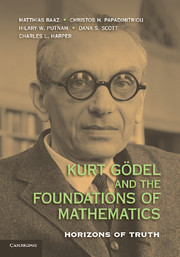Book contents
- Frontmatter
- Contents
- Contributors
- Foreword
- Preface
- Acknowledgments
- Short Biography of Kurt Gödel
- I Historical Context: Gödel's Contributions and Accomplishments
- Gödel's Legacy: A Historical Perspective
- The Past and Future of Computation
- Gödelian Cosmology
- II A Wider Vision: The Interdisciplinary, Philosophical, and Theological Implications of Gödel's Work
- Gödel and the Mathematics of Philosophy
- Gödel and Philosophical Theology
- Gödel and the Human Mind
- 15 The Gödel Theorem and Human Nature
- 16 Gödel, the Mind, and the Laws of Physics
- III New Frontiers: Beyond Gödel's Work in Mathematics and Symbolic Logic
- The Realm of Set Theory
- Gödel and the Higher Infinite
- Gödel and Computer Science
- Index
15 - The Gödel Theorem and Human Nature
Published online by Cambridge University Press: 07 September 2011
- Frontmatter
- Contents
- Contributors
- Foreword
- Preface
- Acknowledgments
- Short Biography of Kurt Gödel
- I Historical Context: Gödel's Contributions and Accomplishments
- Gödel's Legacy: A Historical Perspective
- The Past and Future of Computation
- Gödelian Cosmology
- II A Wider Vision: The Interdisciplinary, Philosophical, and Theological Implications of Gödel's Work
- Gödel and the Mathematics of Philosophy
- Gödel and Philosophical Theology
- Gödel and the Human Mind
- 15 The Gödel Theorem and Human Nature
- 16 Gödel, the Mind, and the Laws of Physics
- III New Frontiers: Beyond Gödel's Work in Mathematics and Symbolic Logic
- The Realm of Set Theory
- Gödel and the Higher Infinite
- Gödel and Computer Science
- Index
Summary
In the Encyclopedia of Philosophy (Edwards, 1967, 348–49), the article by Jean van Heijenoort titled “Gödel's Theorem” begins with the following terse paragraphs:
By Gödel's theorem the following statement is generally meant:
In any formal system adequate for number theory there exists an undecidable formula, that is, a formula that is not provable and whose negation is not provable. (This statement is occasionally referred to as Gödel's first theorem.)
A corollary to the theorem is that the consistency of a formal system adequate for number theory cannot be proved within the system. (Sometimes it is this corollary that is referred to as Gödel's theorem; it is also referred to as Gödel's second theorem.)
These statements are somewhat vaguely formulated generalizations of results published in 1931 by Kurt Gödel, then in Vienna.
Despite its forbidding technicality, the Gödel (1931) theorem has never stopped generating enormous interest. Much of that interest has been piqued because with the proof of the Gödel theorem, the human mind has succeeded in proving that – at least in any fixed, consistent system with a fixed, finite set of axioms that are at least minimally adequate for number theory and in a system that has the usual logic as the instrument with which deductions are to be made from those axioms – there has to be a mathematical statement the human mind cannot prove.
- Type
- Chapter
- Information
- Kurt Gödel and the Foundations of MathematicsHorizons of Truth, pp. 325 - 338Publisher: Cambridge University PressPrint publication year: 2011
- 1
- Cited by

